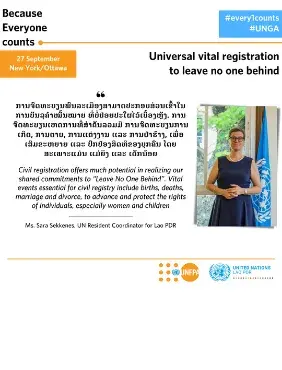Excellencies,
Good morning, Good evening colleagues,
As highlighted in the Lao People’s Democratic Republic’s 9th National Socio-Economic Development Plan NSEDP (2021-2025), civil registration offers much potential in realizing our shared commitments to “Leave No One Behind” and vital statistics can provide key insights into population dynamics and development progress.
Such insights are important to ensure that public social service policies respond to population needs and provide individuals with essential legal documents required to secure identity, nationality and civil rights. While the SDG indicator 16.9 “legal identity for all, including birth registration, by 2030” is amongst the localized SDG indicators in Laos, much remains to be done.
As part of the mid-term review for the CRVS Decade in Asia and the Pacific, the Government reported that birth registration is 43% complete, and the registration of deaths is 37% complete. What we may take for granted in modern society -- to travel abroad, to open a bank account, to lawfully and securely inherit, or to register partnerships, is not necessarily possible for all. For children, the absence of a birth certificate means the lack of legal protection from exploitation and access to justice when in contact with the law.
Exclusion and invisibility is not randomly distributed. The Government recognises the need to effectively address these challenges to tackle the persistent geographical disparities based on ethnicity, language, gender, age, educational attainment, disability, and social-economic status. In this regard, these crucial investments in integrated population data systems, CRVS, and Population Housing Census using digital tools, are smart investments in realizing the promise to “Leave No One Behind”, wherever they are.
The UN Country Team has taken a whole-of-system approach to support the Government’s CRVS system-strengthening efforts.
- The World Bank, via a $25m IDA loan, is supporting the Ministry of Home Affairs in digitizing the country’s CRVS system.
- WHO is supporting the Ministry of Health in the registration of births, deaths and training of physicians to medically certify causes of death,
- UNICEF is building public awareness of birth registration via parenting education programs and supporting mobile teams of the Ministry of Home Affairs to register children in remote districts.
- UNDP supports the establishment of one-door-service-centres across ministries and facilitates UNDESAs lessons learnt across countries to help the Lao Government finalize the approach.
- UNFPA is focusing on the strengthening of marriage registration and improving the quality of vital statistics production, dissemination and use and has been placed to lead the coordination of UN support on CRVS to the Government.
The country has set an interim target of completing 70% of birth registration and 46% of death registration by 2024 and with UNFPA support, it is also on track for its next population and housing census in 2025.
The family registration law and National CRVS Strategy 2016-2025, guide the CRVS work in the country. The 2030 Agenda, and renewed commitments at the 25th Anniversary of the ICPD Programme of Action, provide a real opportunity for accelerated action to transform the administrative data systems to be fully inclusive across the entire life-cycle.
The UN Country Team in Lao PDR welcomes the hosting of the Centre of Excellence on CRVS Systems by UNFPA, and thanks the Government of Canada for its sustained commitment to inclusive societies and gender equality. We look forward to harnessing the centre’s practical guidance and technical tools, but also in contributing insights from Lao PDR’s CRVS system- strengthening efforts to the global repository of lessons learned.
Following the recommendations of a joint Vital Statistics Assessment, it is our ambition to provide comprehensive, collective support to the Government, and we will further consolidate efforts to off-set the negative impacts of COVID-19.
As Laos transitions from a predominantly rural society to being over 50% urban in the coming years, the UN, with partners will support Government efforts to ensure that Lao people, from all 50 ethnicities, especially women and vulnerable groups facing challenges of language, terrain, social norms and behaviors, have security of legal identity and societal inclusion, so that Lao PDR can realise its potential for a demographic dividend in the years to come.
I thank you, and count on the continuing and hopefully growing support of the CONVERGE initiative to the UNCT and Government of Lao PDR.



